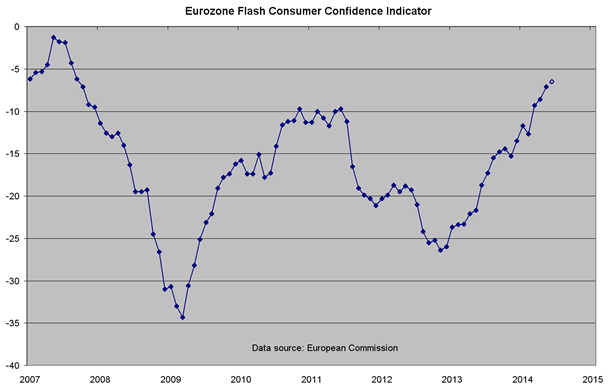- Bank of Japan to urge economic reforms
- ECB's Mersch backs mutualised social security
- Eurozone consumer confidence lifting
Today’s data calendar is light, and after the Federal Reserve’s meeting, attention has shifted to next week’s purchasing manager indices for June. While today’s two central banker speeches might not attract immediate attention, they are probably important watershed moments for a couple of key issues. The euro area’s consumer confidence will give us a preview of the next week’s June sentiment galore.
Japan Bank of Japan’s governor Kuroda speaks (06:35 GMT). Bank of Japan’s governor Haruhiko Kuroda will be speaking at the annual meeting of the National Association of Shinkin Banks in Tokyo. The Japanese recovery is still in doubt. While inflation has picked up and the sentiment remains upbeat, productivity improvements and labour force shortages are still constraining the outlook. Kuroda has already previously broken the traditional separation of economic powers and urged the prime minister to hasten the “third arrow” of economic reforms, so that the boost provided by Bank of Japan’s unprecedented monetary expansion would not go to waste. According to Reuters, a former top bank of Japan economist warned that Japan risks falling into stagflation - higher inflation with little or no economic growth. Bloomberg noted that households and businesses are still not trusting Abenomics, as they are sitting on cash and not investing.
I believe Kuroda will continue presenting the same message, and markets might take such talks as a sign that Abenomics is not working properly, and that the BoJ is unwilling to provide additional monetary stimulus before the government gets its act together on the “third arrow”.
European Central Bank’s Mersch speaks (08:15 GMT). Yves Mersch, member of the European Central Bank's (ECB) executive board, will be speaking at a conference “Economic shock absorbers for the Eurozone: Deepening the debate on automatic stabilisers”. The title of his speech is “What form of fiscal capacity does the EMU need? Do we need a grand bargain between automatic stabilisation and enforceable structural reforms?”
It is well-understood by now that a currency union without some level of federalisation had been a bad idea. After forming the banking union and backstopping the government debts by rescue vehicles and the ECB’s word, the next step will be fiscal transfers between member states. Such transfers would alleviate country-specific shocks by mutualising social security in the euro area. In practice, automatic stabiliser is just a fancy word for unemployment benefits.
It is obvious that the electorate in countries like Germany and Finland are not terribly happy with the idea that they would share in the costs caused by the Spanish unemployment, but that does not stop Brussels from planning such measures. The event is organized by the Bertelsmann Stiftung, and the European Commission’s Directorate-General for Employment, Social Affairs and Inclusion. The first one is a strong supporter of the euro project and chancellor Merkel’s policies. The event’s website has plenty of reading material on the topic. As the monetary union cannot function without fiscal transfers, while such ideas would face political opposition in the countries that would end up picking up the bill, I believe this event will mark the beginning of a long and arduous project. At the end there will either be a federal euro area or further stagnation leading to an eventual break-up of the currency union.
Europe June Consumer Confidence (14:00 GMT). The euro area’s consumer confidence is expected to again improve in June to -6.5 from -7.1 in May. Consumer’s optimism has been steadily increasing since ECB’s president Mario Draghi’s promise in 2012 to do “whatever it takes” and the euro crisis has dropped out of mainstream news. While businesses have become more optimistic as well, their mood improvement is much more moderate, and real economic growth has been elusive. 
The longer chart reveals that consumer confidence previously peaked right before the collapse of the dotcom bubble in 2000, the financial crisis in 2007 and the euro crisis in 2010. The current era of low volatility and low yields is unlikely to last forever, and most of the issues that trouble the EUR area are still unsolved. Like many asset prices, also the consumer confidence seems to be entering levels that could be interpreted as being stretched. Perhaps it would be prudent to begin taking a contrarian approach to such optimism. The full country-specific results, including business sentiment, will be published by the European Commission next week on Friday, June 27. Before that, the Markit’s purchasing manager indices on Monday and the German Ifo sentiment on Tuesday should shed more light on Europe’s growth outlook.
